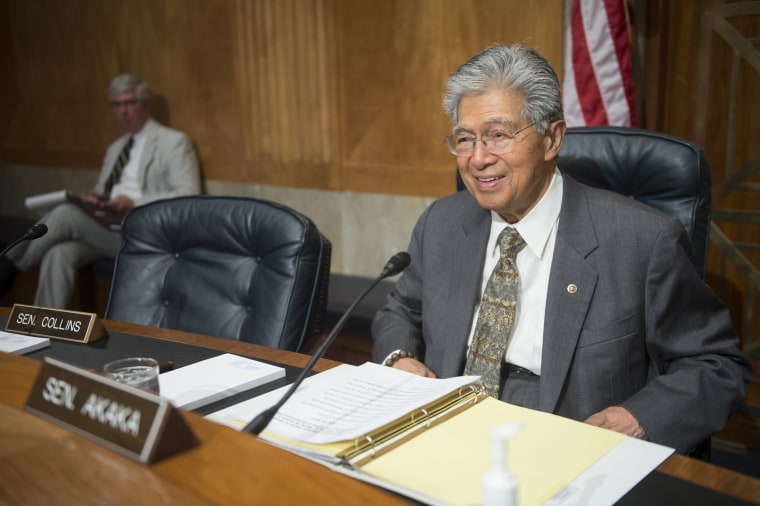Former Democratic Sen. Daniel Akaka, who represented Hawaii in Congress for nearly four decades and was regarded as a champion of Native Hawaiian culture, died early Friday morning. He was 93.
Jon Yoshimura, Akaka’s former communications director, confirmed Akaka’s death on Friday afternoon. He said Akaka died just before 5 a.m.
Akaka had been hospitalized in November because of a leg infection, according to Yoshimura. He recovered from that, went into rehab and was walking around, Yoshimura said. But about a month ago, Akaka had a medical event that required he return to the hospital, Yoshimura said.
“When he went back to the hospital, that’s when his condition steadily worsened,” he said.
Condolences came in from elected officials who paid tribute to the former educator and principal who served in Congress for 36 years.
U.S. Sen. Mazie K. Hirono, D-Hawaii, said in a statement that Akaka embodied the Aloha Spirit.
“He dedicated his life to serving the people of Hawaii as an educator, and in the U.S. Army, state government, the U.S. House, and the U.S. Senate,” Hirono said. “In Congress, Senator Akaka’s care, empathy, and collegiality served as an example for us all.”
U.S. Rep. Tulsi Gabbard, D-Hawaii, echoed Hirono’s sentiment.
“He treated everyone equally, with kindness, respect & love - no matter who they were or how they treated him,” she tweeted in part.
Regarded as a champion of Asian Americans, Native Hawaiians, and Pacific Islanders during his time in Washington, Akaka sponsored legislation to enhance Hawaiian education programs and a resolution acknowledging the U.S. government's role in overthrowing the Kingdom of Hawaii in 1893. He was the first U.S. senator of Native Hawaiian descent, according to NBC affiliate Hawaii News Now.
In 2014, he received the National Education Association Human and Civil Rights Award, recognized as a ground-breaking educator who introduced Native Hawaiian language and culture into schools.
“The word ‘No’ was never in Senator Akaka’s vocabulary,” said NEA/Hawaii State Teachers Association member Laverne Ferandes Moore at the time. “He spent his career in Congress finding ways to better the lives of Asian and Pacific Islanders.”
Married with five children, Akaka announced in 2011 at the age of 86 that he would not seek reelection at the end of his term.
In a 2012 interview with NBC’s Chuck Todd, Akaka discussed that decision, saying he was looking forward to going back home. In addition to his five children, Akaka said then that he had 15 grandchildren and 15 great-grandchildren, with more of the latter on the way.
“When I went there, I didn’t know them,” Akaka said, referring to a trip back to Hawaii in 2011. “I had to ask their names, who’s their parents.”
Akaka said in a statement at the time that choosing to retire was “a very difficult decision.”
"However, I feel that the end of this Congress is the right time for me to step aside,” he said.
In his NBC exit interview, Akaka offered a piece of advice to his successors, one that is uniquely Hawaiian.
“I feel that since I came here, one of the things I’ve tried to do — and done it as much as I can — was to bring about a feeling here, of a spirit, that comes from Hawaii, that we call Aloha spirit,” he said, “because it opens things up, it cuts down fences, it helps people to feel the need to work with each other.”
“I hope those who will succeed us here will continue that,” Akaka said.
Follow NBC Asian America on Facebook, Twitter, Instagram and Tumblr.
